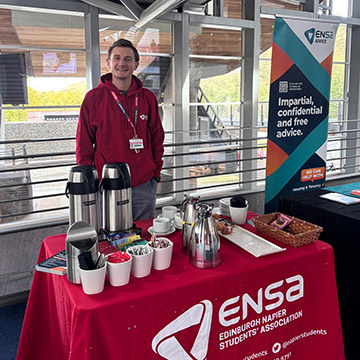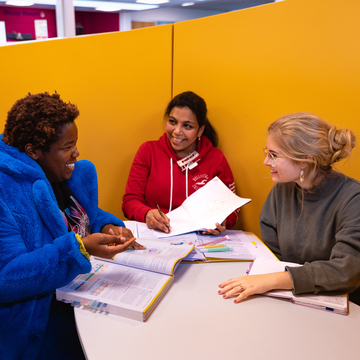Support and advice
After you've made it through your first few weeks, we'll be with you every step of the way as you continue your Edinburgh Napier journey, through study to graduation and beyond. You'll be able to access a range of useful services that will help you through your time at university, from wellbeing to careers support and much more!
Remember, your Personal Development Tutor (PDT) is assigned to you during the first few weeks at Edinburgh Napier and will be your first point of contact for any academic or personal issues you may experience throughout your time at university.
Looking after your mental wellbeing
Starting at university is an exciting time, but we know it can have its challenges as well. Moving into a new home, making friends, getting used to academic life and your studies - there's a lot to take on!
It’s completely normal to feel a bit unsettled or overwhelmed, especially at the beginning of your university journey. If you find yourself starting to struggle, the University's wellbeing team is here to help with advice, counselling and single-session therapy, plus a range of free wellbeing resources you can make use of. We also have teams to help with money problems and disability support, so make sure to reach out if you're going through a hard time.
Discover our full range of wellbeing support services
ENSA Advice
ENSA runs a free, professional and independent advice service for students, covering a range of education and welfare rights issues. If you run into problems and don’t know where to turn, make an appointment.
The service is available on all three campuses, with video call or phone appointments also available.

Free period products

SafeZone
SafeZone is a free app designed to keep you safe on campus by connecting you directly to our Edinburgh Napier 24-hour security team.

Student Health Guide
The Student Health Guide online magazine is full of useful health-related information and advice to support your mental, emotional and physical wellbeing.

Understand what our Student Community Code means for you
The Student Community Code is an important document which explains how you are to behave as a student. As a member of the Edinburgh Napier community, you're expected to uphold and adhere to our values and behaviours.
The four values of the code (Professional, Ambitious, Innovative, Inclusive) mirror those in place for University staff, bringing the entire University community into alignment.
Careers support with Employability & Careers
It's never too early to start thinking about what you'll do after your university journey. Our Employability & Careers team is here to support you with all your career and development needs, whether it's exploring career options and finding jobs, setting up placements and work experience, writing CVs and making applications, and much more.
You'll find all the resources you need on myFuture - an online platform where you can search for a range of job opportunities, workshops and events, and careers appointments. Book one-to-one meetings, confirm your place at one of our employer events, or search for part-time and graduate vacancies.
You can also access our Career Hub, where you'll find a range of digital placement support and interactive resources such as a CV builder and interview simulator.
Find out more on our Careers support pageImprove your academic & study skills
The Academic Skills team can help you to understand how best to approach your university studies. Our advisers work with students at every level and programme of study, whatever their previous experience or aspirations .Improve your academic & study skills
